Key takeaways:
- Ocean conservation is crucial for the health of marine ecosystems and human well-being, emphasizing the interconnectedness between the ocean and life on Earth.
- Reef ecosystems are essential for biodiversity, coastal protection, and climate regulation, reflecting the need for their preservation to ensure a sustainable future.
- The main threats to coral reefs include climate change, pollution, and overfishing, which necessitate immediate action to protect these vital habitats.
- Individual actions, such as reducing plastic use and participating in local conservation efforts, can significantly contribute to reef preservation and inspire broader community engagement.
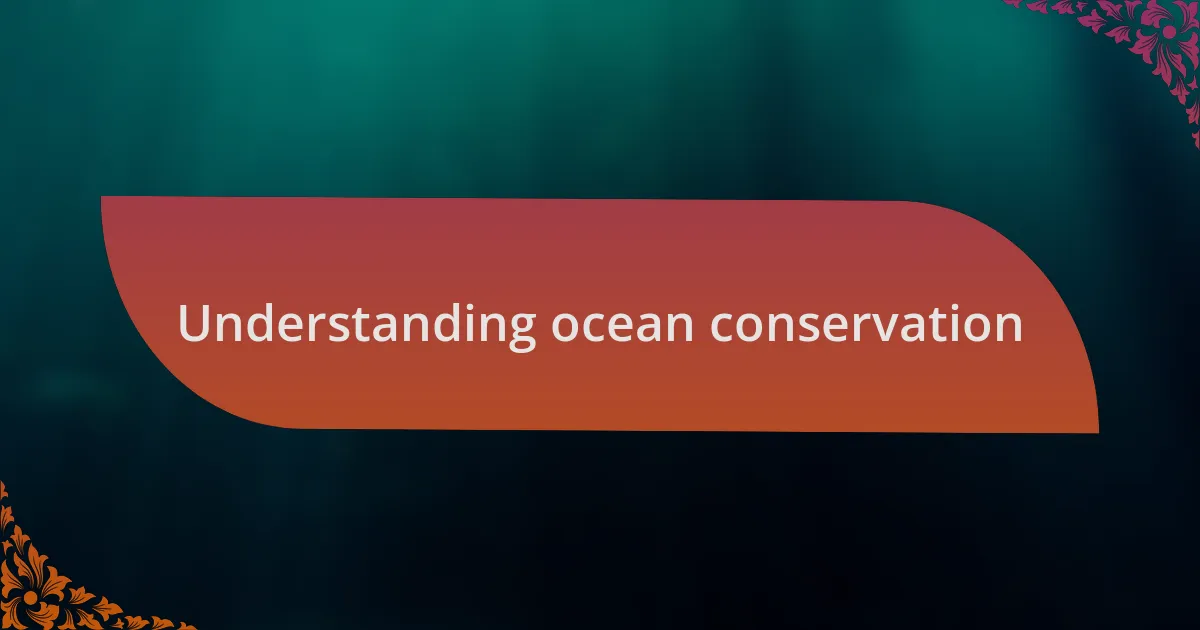
Understanding ocean conservation
Ocean conservation is a multifaceted effort that aims to protect marine ecosystems and the biodiversity they harbor. I remember my first dive into a vibrant coral reef; the colors and life forms were astonishing, but it was also heartbreaking to see bleached corals. How can we cherish such beauty yet allow it to fade away?
Engaging with ocean conservation means understanding the delicate balance of marine habitats. It’s not just about saving fish or corals; it’s about preserving the intricate web of life that supports countless species, including our own. I often reflect on how interconnected we are with the ocean. If our oceans are healthy, so are we. Isn’t it fascinating that the air we breathe largely comes from the ocean?
In my view, the journey toward ocean conservation begins with education and awareness. Every conversation I have about marine life increases my passion for preservation; it’s like igniting a spark in others. How often do we take a moment to appreciate the ocean’s gifts? I believe the more we engage with the ocean’s wonders, the more compelled we feel to protect them.
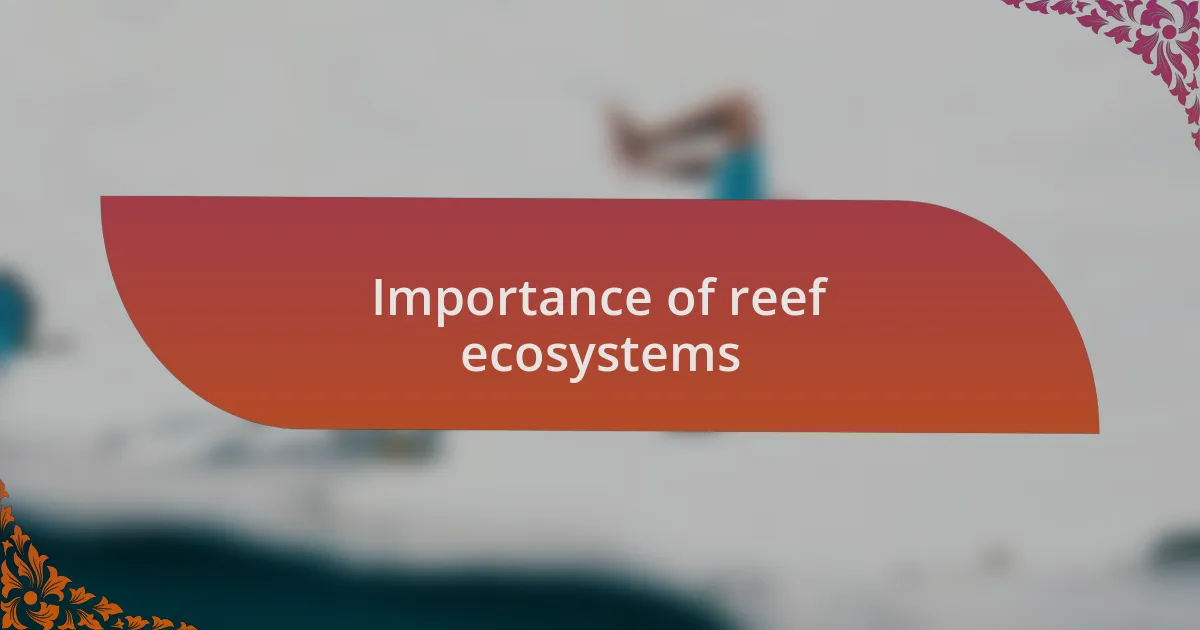
Importance of reef ecosystems
Reef ecosystems serve as the vibrant heart of the ocean, supporting an incredible array of marine life. I still remember the joy of watching a school of colorful fish dart among the corals; it was a moment that made me realize how vital these habitats are to the overall health of our oceans. Without reefs, we would lose not just biodiversity, but also the foundational building blocks for a thriving ocean.
These ecosystems do more than just house diverse marine species; they act as natural barriers against storms and erosion, protecting coastlines and communities. I’ve encountered fishermen whose livelihoods depend on the health of nearby reefs. It made me ponder: what happens to our communities when these critical habitats decline? The connection between reef health and human welfare is undeniable.
Furthermore, reefs play a significant role in carbon cycling, which is essential in combatting climate change. I often think about the profound impact of coral death on our planet’s climate—how can we let such irreplaceable structures disappear? Our responsibility to preserve reef ecosystems extends beyond conservation; it’s about safeguarding our future and the health of the entire planet.
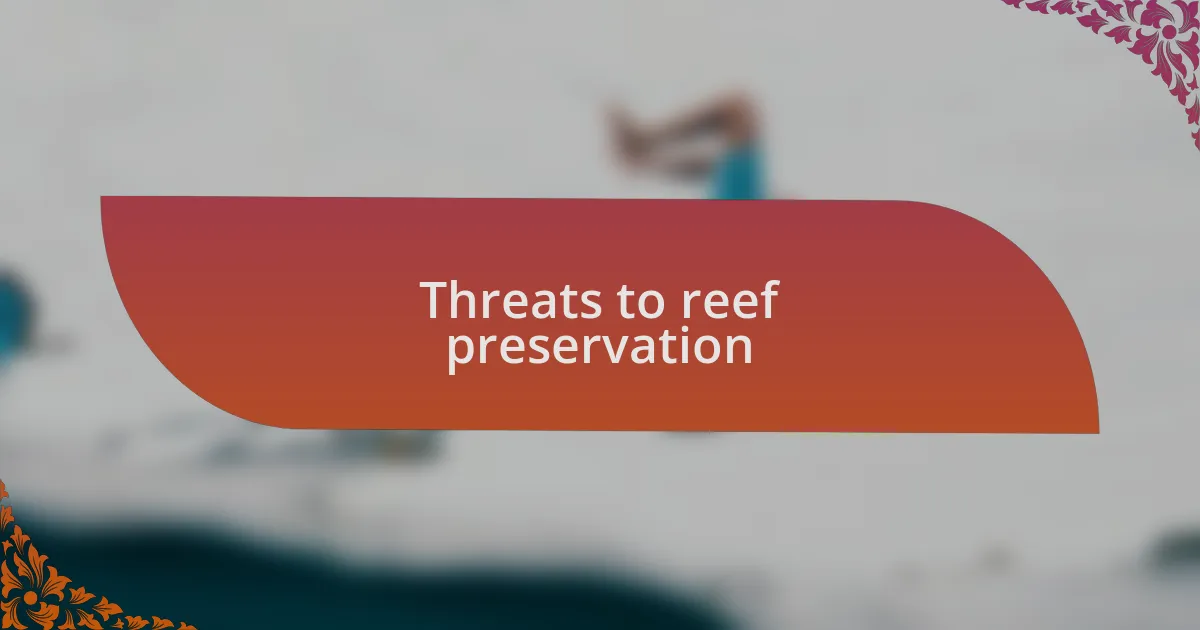
Threats to reef preservation
Coral reefs face an array of threats that jeopardize their existence. One of the most pressing dangers is climate change, which leads to ocean warming and coral bleaching. I can still vividly recall diving in waters that were once teeming with color but now resemble ghostly graveyards—a stark reminder that our planet’s temperature rise is more than just numbers on a screen; it’s a tangible crisis.
Additionally, pollution from coastal development and agricultural runoff introduces toxins into reef environments. I once spoke with a marine biologist who explained that these pollutants create dead zones, areas devoid of life, which starkly contrasts with the thriving ecosystems I’ve explored. How can we expect our oceans to recover when we continually feed them poison?
Overfishing is another critical threat that depletes fish populations essential for maintaining reef health. I’ve stood alongside local fishers who lament the dwindling catches and shared stories of the vibrant reefs they once knew. Their sadness raises an important question: what legacy are we leaving for future generations if we do not take action now?
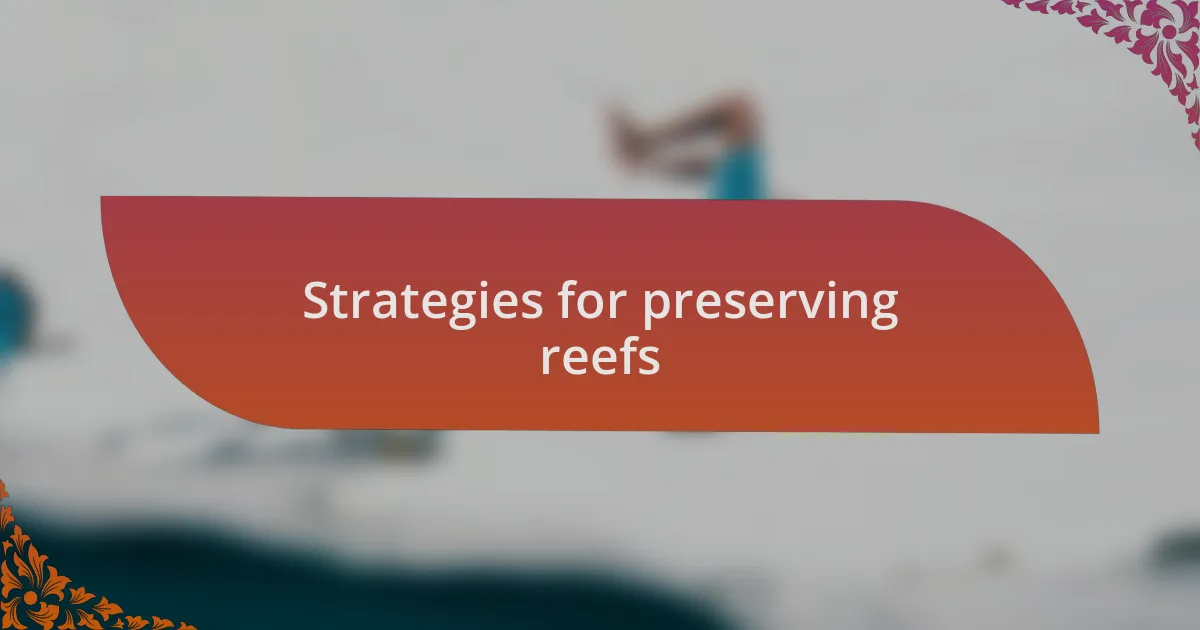
Strategies for preserving reefs
When it comes to preserving reefs, one of the most effective strategies is implementing marine protected areas (MPAs). I remember visiting a vibrant marine reserve where the absence of fishing allowed the ecosystem to flourish. The sheer abundance of life I witnessed underwater left me wondering: how many more reefs could be saved if we committed to similar initiatives globally?
Another vital approach is promoting sustainable fishing practices among local communities. I had the privilege of participating in workshops where fishers learned about using selective gear that minimizes bycatch, minimizing damage to the delicate reef ecosystem. It struck me how these simple alterations could empower communities, ensuring their livelihoods while enabling reefs to thrive once more. Isn’t it inspiring to think that education and awareness can transform destructive habits into stewardship?
Lastly, restoring damaged reefs is key to their survival. I once participated in a coral planting initiative, where volunteers and scientists worked hand in hand to reintroduce corals to degraded areas. Witnessing my first coral sprout into life made me realize how each small action contributes to a much larger impact. How could we not invest in such hopeful endeavors that give us the chance to revive these underwater wonders?
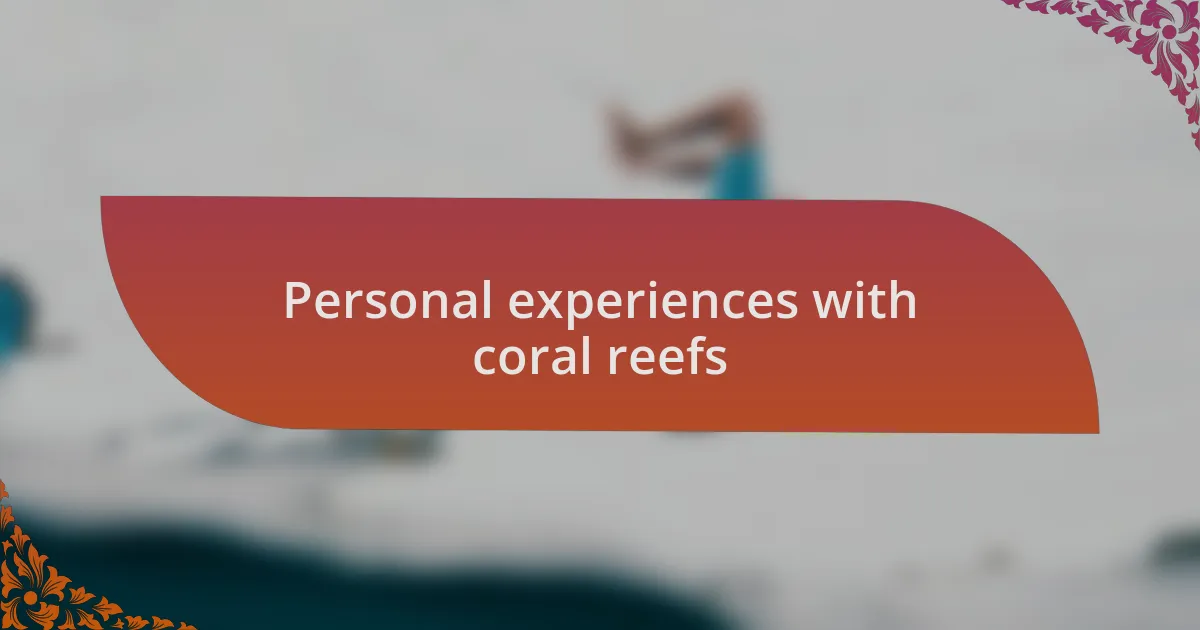
Personal experiences with coral reefs
One of my most unforgettable experiences with coral reefs was during a snorkeling trip in Belize. As I glided over the reef, I was overwhelmed by vivid colors and countless species darting around me. The feeling of being surrounded by such life was both exhilarating and humbling; it made me realize just how interconnected we are with these ecosystems. Have you ever felt so small in the face of nature’s grandeur?
On another occasion, I visited a local reef restoration project and had the chance to meet some of the volunteers. Hearing their stories of hope and resilience transformed my understanding of coral preservation. One volunteer shared a heart-wrenching tale of how her family’s livelihood depended on the health of the reef, which had suffered devastating bleaching. It was a stark reminder that the fight for corals isn’t just about environmentalism; it’s about people, their stories, and their futures.
During a recent trip to the Great Barrier Reef, I joined a guided dive that aimed to educate us about coral ecosystems. One moment, in particular, stands out: our guide pointed out a tiny fish nestled within an anemone, illustrating the delicate relationship between species. I found myself pondering the fragility of these connections—what happens if one thread is pulled too hard? It left me with a lingering concern about our responsibility in protecting these intricate webs of life.
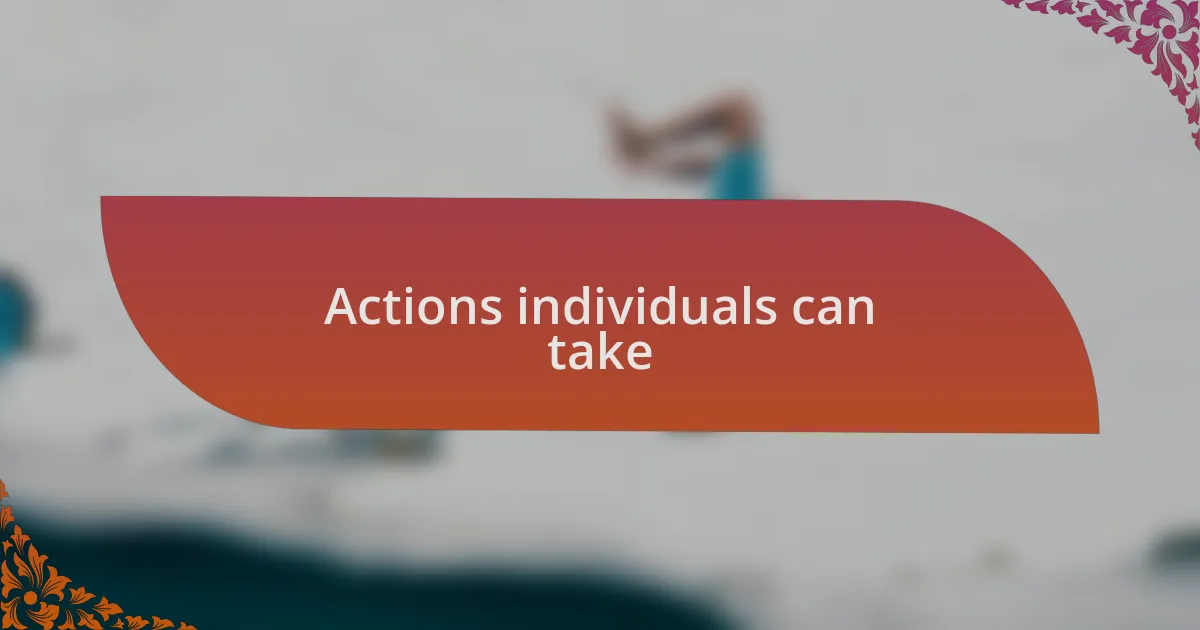
Actions individuals can take
When it comes to reef preservation, one simple action I encourage is reducing plastic use. I remember the time I switched to reusable bags and bottles; it was eye-opening to see how easy it is to lessen waste. Each small choice contributes to less plastic pollution, which can wreak havoc on marine ecosystems. Have you ever considered how your everyday decisions impact the ocean?
Participating in local beach cleanups can also make a significant difference. I joined one last summer, and seeing the collective effort of volunteers filled me with hope. It’s amazing how just a few hours of our time can lead to cleaner beaches and healthier marine life. Plus, it’s a fantastic way to connect with others who share the same passion for ocean conservation.
Educating those around us is equally vital. I’ve often shared my experiences with coral reefs at community events, sparking conversations about the importance of preserving these ecosystems. Have you thought about how sharing your knowledge could inspire others? The more we talk about it, the more we can mobilize action, creating a ripple effect of awareness and commitment to protecting our oceans.
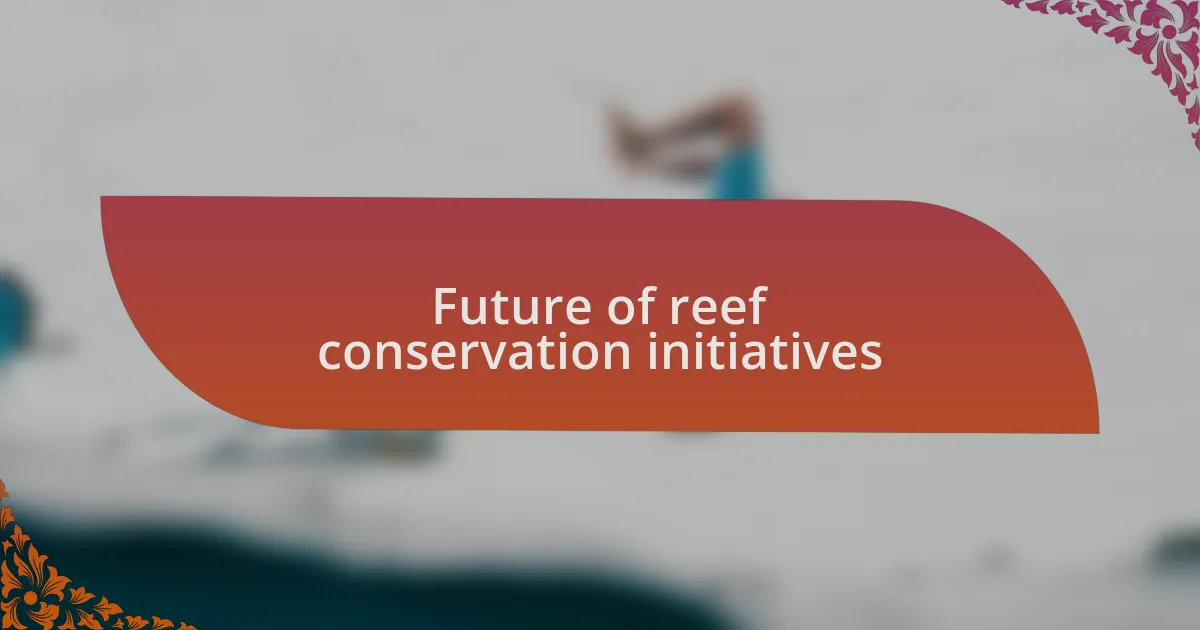
Future of reef conservation initiatives
The future of reef conservation initiatives is looking to harness technology in innovative ways. For instance, I recently attended a workshop focused on the use of drones for monitoring coral health. It was inspiring to see how these tools can provide real-time data, enabling scientists to respond more effectively to threats. Have you ever thought about how technology could change our approach to ocean conservation?
Another exciting development is the growing focus on community-led restoration projects. I recall a local initiative where residents collaborated to replant coral fragments. Watching the transformation of the once-barren area into a thriving reef was profoundly moving. It made me realize that when communities take ownership of their marine environments, they can create sustainable solutions that benefit everyone involved.
Looking ahead, the integration of policy and science is crucial for effective reef conservation. I’ve seen firsthand how local regulations can help protect vulnerable ecosystems, and I believe continued advocacy is essential. Isn’t it exciting to think about how our voices can influence laws that safeguard marine habitats? By combining public support with scientific research, we can pave the way for healthier reefs in the years to come.